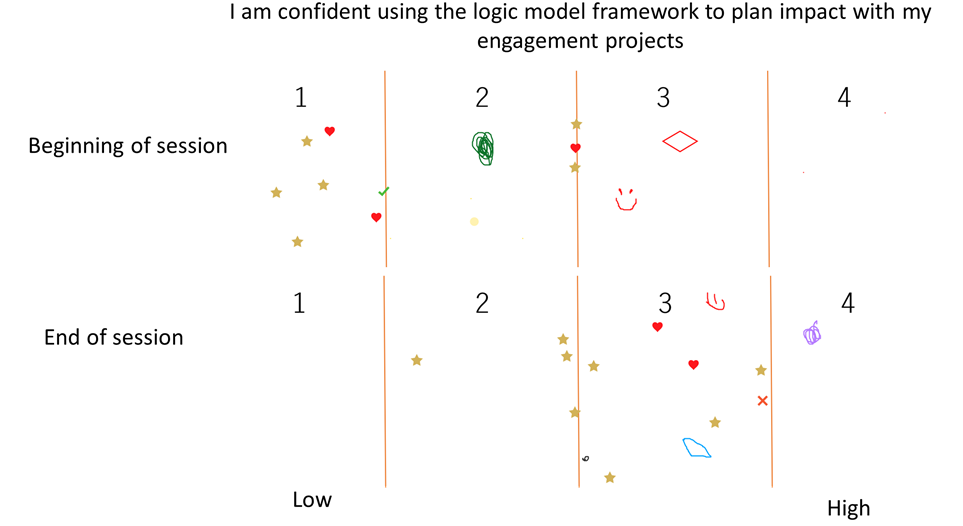CPD training course: Public Engagement with Impact
A review by Rowena Fletcher-Wood
Freelance Science Communicator
[email protected]
ECG Bulletin July 2020
Freelance Science Communicator
[email protected]
ECG Bulletin July 2020
In May 2020, public engagement professional, Dr Sophie Morris ran two 2-day training sessions on “Engagement with Impact”, a programme that aims to equip its participants with the tools to employ the logic model framework to plan and execute a public engagement activity with impact – whether to serve the Research Excellence Framework or industrial outreach targets.
These training sessions, ordinarily delivered face-to-face, piloted use of the online platform Zoom. Although I regularly use online platforms for distance teaching, I found the training as much a tutelage in Zoom as impact. Whilst the platform itself was a bit glitchy with a full room of video participants, Dr Morris is a motivational trainer, who delivers her content with conciseness and clarity – essential online, where every task takes longer. She encouraged the concurrent use of chat to streamline feedback, as well as hands-up tools, feedback quizzes before, between and after the two sessions, and doodling on on-screen charts. It was my first experience using breakout rooms in Zoom, which have the advantage of nurturing networking, and the disadvantage of wrenching you abruptly out of spaces mid-sentence according to the timetable. Additional tools included email, and the resource sharing platform OneDrive.
The two training sessions were distinguishable in their styles, information density, and level of engagement. The first 2-hour session was primarily trainer-led, acting as an introduction to the logic framework. From the perspective of a participant for whom the training served as a reminder of best practice rather than guide to new material, it could have included more participation – listening alone can be exhausting. During part 2, however, we concentrated on the more participatory practical application of case studies and the evolution of our own projects, including reflection, discussion, and small group feedback. The differences between impact and outcomes were explored, and the relationship between these and inputs when it comes to planning engagement activities. Essential considerations including GDPR, ethics, and audience limitation arose, and tools for gathering feedback were specified and detailed in an e-handout.
This is not the only training Dr Morris offers. Her other programmes include “Public Engagement 101” and “Three Minute Pitch” – which are best suited to those new to public engagement and public speaking. Although there is not, at present, a follow up to “Engagement with Impact”, more seasoned communicators could benefit from a third session exploring the history of, development of, and ongoing challenges in public engagement strategy. This, for example, might cover when and when not to evaluate (and the risks of over-interpreting evaluation data) and how to pitch the benefits of public engagement activities to the professionals who will deliver it. Dr Morris is currently in the process of upgrading her training provision, and offers tailored 1:1 courses.
Recommendations
I would recommend this training to academic and industrial professionals, especially those who have previous experience in public engagement, but are yet to plan and execute their own activities.
These training sessions, ordinarily delivered face-to-face, piloted use of the online platform Zoom. Although I regularly use online platforms for distance teaching, I found the training as much a tutelage in Zoom as impact. Whilst the platform itself was a bit glitchy with a full room of video participants, Dr Morris is a motivational trainer, who delivers her content with conciseness and clarity – essential online, where every task takes longer. She encouraged the concurrent use of chat to streamline feedback, as well as hands-up tools, feedback quizzes before, between and after the two sessions, and doodling on on-screen charts. It was my first experience using breakout rooms in Zoom, which have the advantage of nurturing networking, and the disadvantage of wrenching you abruptly out of spaces mid-sentence according to the timetable. Additional tools included email, and the resource sharing platform OneDrive.
The two training sessions were distinguishable in their styles, information density, and level of engagement. The first 2-hour session was primarily trainer-led, acting as an introduction to the logic framework. From the perspective of a participant for whom the training served as a reminder of best practice rather than guide to new material, it could have included more participation – listening alone can be exhausting. During part 2, however, we concentrated on the more participatory practical application of case studies and the evolution of our own projects, including reflection, discussion, and small group feedback. The differences between impact and outcomes were explored, and the relationship between these and inputs when it comes to planning engagement activities. Essential considerations including GDPR, ethics, and audience limitation arose, and tools for gathering feedback were specified and detailed in an e-handout.
This is not the only training Dr Morris offers. Her other programmes include “Public Engagement 101” and “Three Minute Pitch” – which are best suited to those new to public engagement and public speaking. Although there is not, at present, a follow up to “Engagement with Impact”, more seasoned communicators could benefit from a third session exploring the history of, development of, and ongoing challenges in public engagement strategy. This, for example, might cover when and when not to evaluate (and the risks of over-interpreting evaluation data) and how to pitch the benefits of public engagement activities to the professionals who will deliver it. Dr Morris is currently in the process of upgrading her training provision, and offers tailored 1:1 courses.
Recommendations
I would recommend this training to academic and industrial professionals, especially those who have previous experience in public engagement, but are yet to plan and execute their own activities.

Training slide. Attendees were asked to tell themselves the statement “I am confident using the logic
model framework to plan impact with my engagement projects”. On a scale from 1 (being low) and
4 (being high) attendees were asked to reflect on how much they agreed with that statement by annotating a doodle of choice into the above columns.

Dr Sophie Morris’ training suite
Public Engagement 101: The what, why and how of public engagement
A workshop designed for those new to public engagement, this course includes different methods of engagement, knowing your target audiences and tailoring engagement activities to them, and the role that public engagement plays in our society.
Three Minute Pitch: Developing your elevator pitch to summarise the highlights of your work in three minutes
A workshop for those working on communication and presentation skills. This course focusses on getting to know your target audience (and what they may want to hear), working out a pitch structure, and practising its execution.
Engagement with impact: How to manage and evaluate your public engagement project to achieve impact
This workshop uses a case study to teach practical public engagement project planning, including references to target audiences, budgeting and evaluation. It uses the logic framework approach to project management, and offers peer-to-peer feedback and networking.
Dr Sophie Morris has over 6 years of experience in public engagement and is an accredited educator in the higher education sector. After completing a PhD in Cancer Immunotherapies she went on to develop her skills in science communication, public engagement and research impact in various roles. Current work includes designing and delivering public engagement training for different organisations across the UK and beyond.
You can contact Sophie about her training provision at [email protected], or read more on her website https://drsophiemorris.com
Public Engagement 101: The what, why and how of public engagement
A workshop designed for those new to public engagement, this course includes different methods of engagement, knowing your target audiences and tailoring engagement activities to them, and the role that public engagement plays in our society.
Three Minute Pitch: Developing your elevator pitch to summarise the highlights of your work in three minutes
A workshop for those working on communication and presentation skills. This course focusses on getting to know your target audience (and what they may want to hear), working out a pitch structure, and practising its execution.
Engagement with impact: How to manage and evaluate your public engagement project to achieve impact
This workshop uses a case study to teach practical public engagement project planning, including references to target audiences, budgeting and evaluation. It uses the logic framework approach to project management, and offers peer-to-peer feedback and networking.
Dr Sophie Morris has over 6 years of experience in public engagement and is an accredited educator in the higher education sector. After completing a PhD in Cancer Immunotherapies she went on to develop her skills in science communication, public engagement and research impact in various roles. Current work includes designing and delivering public engagement training for different organisations across the UK and beyond.
You can contact Sophie about her training provision at [email protected], or read more on her website https://drsophiemorris.com

